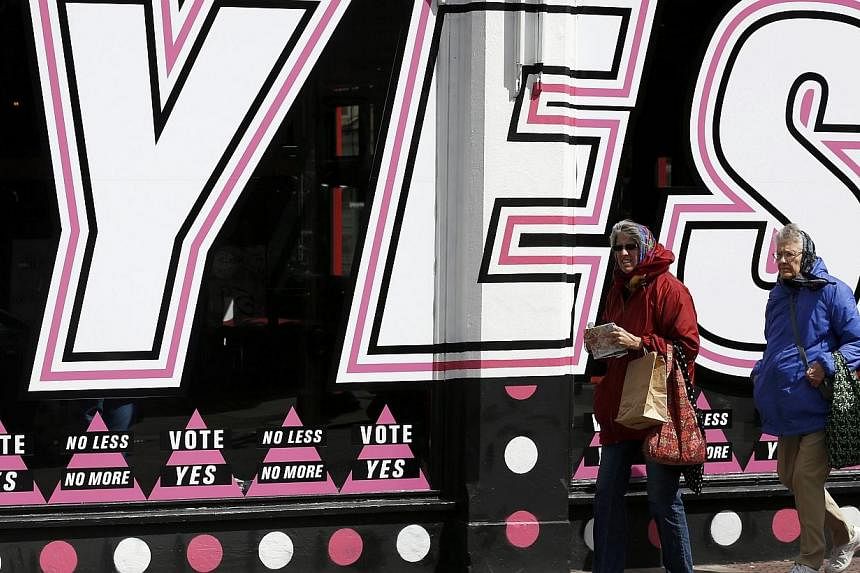DUBLIN (REUTERS) - Its word was once law in Ireland on everything from contraception to divorce. Now, shorn of much of its influence, the Catholic Church has limited campaigning on Friday's gay marriage referendum to sermons to its remaining flock.
Little over two decades after it legalised homosexuality, Ireland will become the first country to approve same-sex marriage via a popular vote, if polls that predict a victory by as much as two-to-one prove accurate.
The issue has dominated the media for weeks but the Church has been largely absent, its influence ravaged by revelations of child abuse by priests and members of religious orders, after decades of gradual decline.
Although the main political parties are campaigning for a 'Yes' vote, the head of the Irish Catholic Church said it "would be wrong (to think) that somehow this is a Church-state battle".
"We would see ourselves as important contributors and we will primarily exercise that voice to our own people, in our own churches," Archbishop Eamon Martin told state broadcaster RTE.
That is a stark change from the 1970s and 1980s when the clergy spoke out publicly and strongly against contraception and divorce that were still illegal in Ireland.
It also contrasts with the role the Church played in France in 2013, when it helped lay groups organise some of the largest protests in decades in a sophisticated campaign against the legalisation of same-sex marriage there.
That did not succeed, but sparked a lively debate and raised doubts about issues such as surrogacy rights for gay couples.
Opposition to the referendum in Ireland has instead been left to civil groups.
"I think they (the Irish church) probably did the right thing," said Petra Conroy, project coordinator for Catholic Comment, a group of mainly lay Catholics who are campaigning for a 'No' vote. "For any faith, it's not good if the people are only doing something because somebody else is telling them to."
Despite changing attitudes, the Church still retains more power in Ireland than most places in Europe. Having run many of Ireland's social services in the 20th century, most schools are still under its control and almost two-thirds of marriage ceremonies are celebrated in Catholic churches.
While the number of Irish people who describe themselves as Catholic has fallen slowly to 84 percent, according to the 2011 census, churches began to empty before the abuse scandals and only around one-third attend church weekly.
For the handful of priests who have said they will vote 'Yes', the church has missed an opportunity.
"I think on this one, they're doing themselves a lot of damage by the stand they're taking," said Father Tony Flannery, a founder of the reformist Association of Catholic Priests in Ireland group and a supporter of same-sex marriage. "This referendum in particular is one that is very attractive to the younger generation. For the official Church to be taking such a consistent no line on it, they're just further alienating a group that has largely left the Church anyway."
"I would have thought that that was foolish."

